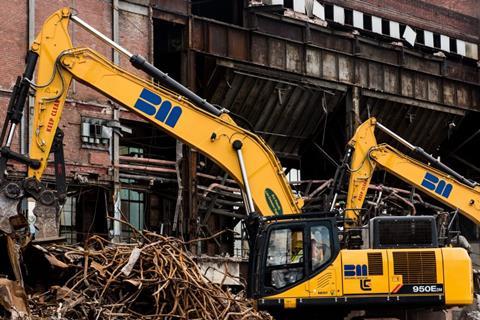Revelations include promise made by one firm to rival to ‘buy me off the job’
Another director of a demolition firm has been banned by the Competition and Markets Authority following its probe into bid-rigging in the sector, bringing the total number now disqualified to four.
The latest details have been spelt out on the cartel-buster’s website with Nicholas Brown, currently managing director of the Brown and Mason Group (BMG), and before managing director of Brown and Mason for five years until it went into administration in September 2020, joining three others in receiving a disqualification.
His penalty starts on 28 July and will run for seven years, taking the total cumulative ban of the quartet to nearly 25 years.

Announcing in March that 10 firms had been fined nearly £60m for their involvement in the scandal, the CMA said “bids were rigged by one or more construction firms which agreed to submit bids that were deliberately priced to lose the tender [known as cover pricing]”.
Five of the 10 were also found guilty of making and receiving “compensation payments” under which, the CMA said, “the designated ‘losers’ of the contracts were set to be compensated by the winner”. Brown and Mason was one of the firms found guilty of receiving such payments.
In a statement yesterday, the CMA said: ‚ÄúNicholas Brown has admitted being personally involved in two breaches of competition law affecting contracts for demolition services with a total value of over ¬£30 million including one relating to the Shell ∫√…´œ»…˙TV on London‚Äôs Southbank, and the other relating to the Lots Road Power Station in London.
“‘Compensation payments’ with an aggregate value of £700,000 (excluding VAT) were paid to Brown and Mason by two competitors in return for Brown and Mason’s participation in the anti-competitive agreements.
“Mr Brown has admitted taking a ‘central role’ in this conduct, including by instructing staff to collect the payments by issuing invoices relating to ‘fictional services and goods’ that were not in fact ever supplied by Brown and Mason.
“Mr Brown further acknowledged that, as a shareholder in Brown and Mason, he stood to benefit personally from these payments, and that he understood at the time that his conduct was wrong.”
The CMA also made public details of how the payments were agreed and made ‚Äì with McGee, which won the Shell ∫√…´œ»…˙TV scheme, paying Brown and Mason ¬£600,000 with the payment made across a year and split into three portions. One amount of ¬£203,500, Brown said, was ‚Äúmade out for the ‚Äòsupply of second hand trusses at the Leicester Square development‚Äô‚Äù.
Explaining how the compensation payment was agreed, Brown admitted: ‚ÄúI was contacted by [name redacted] (McGee) after the submission of initial bids for the Shell ∫√…´œ»…˙TV Project. I met with [name redacted] in person and discussed the tender with him. [Name redacted] explained that he wanted the job, provided me with their tender quote and offered to pay Brown and Mason compensation should we agree to submit a quote higher than McGee‚Äôs.‚Äù
Brown said he “did not believe that Brown and Mason would succeed in the tender. I therefore accepted his offer of £600,000 in compensation for placing a cover bid.”
He added: “At the time I made this agreement, I had primary responsibility for decision-making within the business as my father (another director of Brown and Mason and BMG) was absent for medical reasons.
‚ÄúAs I explained in my interview with the CMA, in late 2015, I perceived Brown and Mason to be facing financial difficulty. Recalling my original agreement with [name redacted] and knowing that McGee had in fact secured the Shell ∫√…´œ»…˙TV Project following completion of the tender process, I called [name redacted] and requested payment of the compensation.‚Äù
Last month, the CMA revealed McGee had also paid Erith ¬£500,000 for ‚Äútaking a back seat‚Äù on bidding the Shell ∫√…´œ»…˙TV contract over summer 2013.
Brown and Mason was also paid a £100,000 compensation payment after discussing the Lots Road scheme with eventual winner Scudder, now discontinued by parent Careys.
“On 14 July 2014 [name redacted] (Scudder) sent me a text message requesting a meeting to discuss the upcoming tender for the Lots Road Power Station project…On 28 July 2014, I met [named redacted] at the Thistle hotel near Tower Bridge. At that meeting [name redacted] informed me that he wanted the contract and that he would ‘buy me off the job’.”
Brown said Brown and Mason actually wanted to win the contract and initially refused to take part in a cover bidding process but “following further discussion about the client and the tender process, I agreed to a proposal from [name redacted] that we would respectively increase the prices of our tenders by a set amount, to be paid by the losing party”.

He added that “Brown and Mason intended to win the contract and priced the job with this intention. Nevertheless, following Scudder’s successful tender for the project, I contacted [name redacted] to request the compensation due under our agreement.”
Four invoices were sent out for a total of £100,000, Brown told the CMA, with one for £36,000 “made out for the ‘Consultancy & Survey works undertaken to enable the removal of plant and equipment at Lewisham House, Lewisham’”.
As well as Brown, who joined family-owned Brown and Mason in 1991 and became a director five years later, three other directors have been banned as a result of the scandal.
Cantillon founder Michael Cantillon, David Darsey, a former managing director of Erith, and a previous president of the National Federation of Demolition Contractors, and Paul Cluskey, the managing director of Cantillon, have all been disqualified for a total of nearly 18 years. Cluskey has since appealed his ban of four years and six months in the High Court with a decision due this week.
As well as Brown and Mason, the other firms found guilty of making and receiving compensation payments were Cantillon, Erith, McGee and Scudder. All five were also found guilty of bid-rigging as well along with Keltbray, John F Hunt, DSM, Clifford Devlin and Squibb.
Keltbray, fined £16m, and Squibb, hit with a £2m penalty, are both appealing the level of their fines. The largest penalty, £17.6m, has been handed to Erith.



























No comments yet